Key takeaways:
- Cerebral palsy support encompasses emotional encouragement, social inclusion, and recognizing individual needs.
- Building community connections provides emotional support, valuable resources, and a shared sense of belonging that empowers individuals.
- Engaging in local support groups and online communities facilitates meaningful connections, shared experiences, and the exchange of innovative coping strategies.
- Attending events and sharing personal experiences foster empathy, deeper friendships, and transform support into lasting bonds.
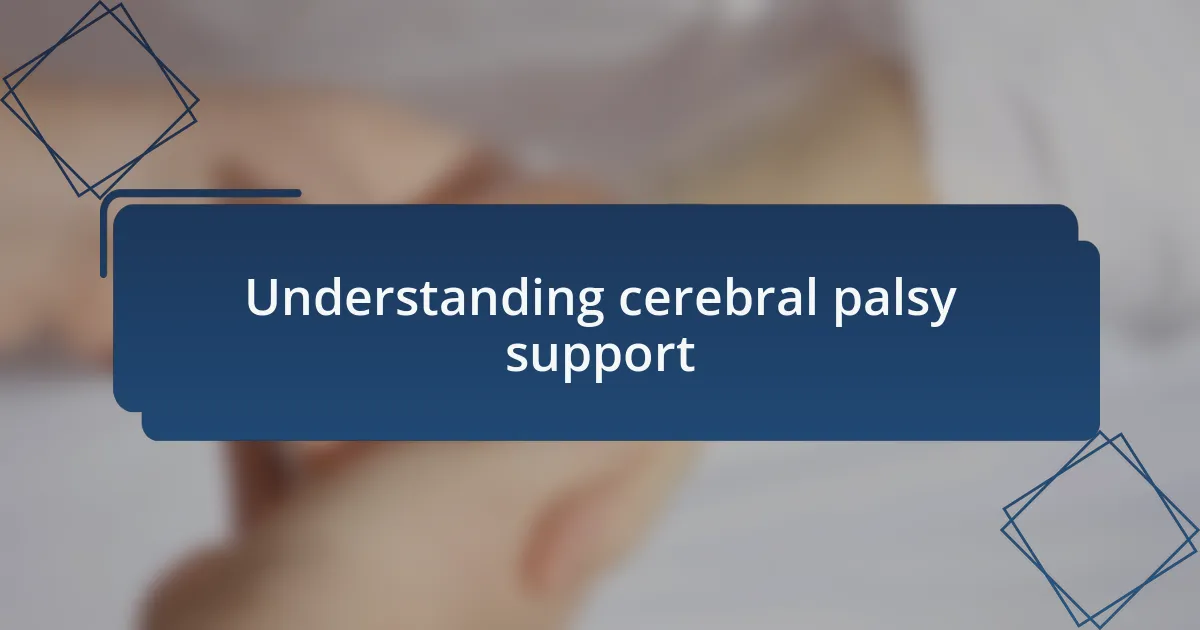
Understanding cerebral palsy support
Understanding cerebral palsy support goes beyond just physical assistance; it encompasses emotional encouragement and social inclusion as well. I remember the first time I attended a support group meeting. It was eye-opening to see people from all walks of life sharing their stories, revealing a sense of camaraderie that was palpable. Have you ever experienced that feeling of being understood by strangers who have walked a similar path?
Support takes many forms, from therapy options to community activities and online resources. I often think about how overwhelming it can feel at the beginning, trying to navigate these options. I recall poring over countless websites, searching for a community where I could truly belong. The moment I found a local group that felt like home made all the difference for my journey.
Moreover, understanding cerebral palsy support is recognizing that each individual’s needs are unique. When I first connected with others in the community, I learned that their challenges and triumphs were different from mine, which helped me to appreciate the diversity of experiences. How can we leverage our unique stories to uplift one another? It’s through sharing, listening, and being present that we create a robust support network.
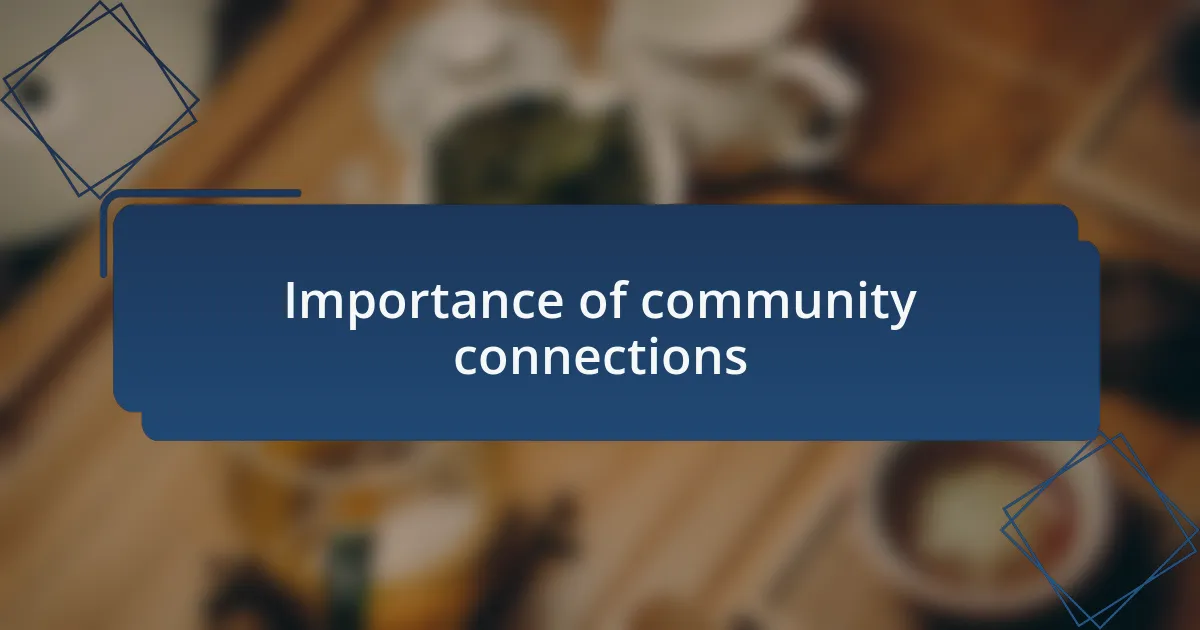
Importance of community connections
Building community connections is vital for anyone navigating life with cerebral palsy. I remember a time when a peer reached out to me after our support group meeting, and it was as if a weight had been lifted. That simple exchange led to a friendship that not only provided emotional support but also opened doors to valuable resources I hadn’t known existed.
The strength of a community can be a powerful motivator. During one workshop, I saw firsthand how collective experiences can inspire individuals to push beyond their limits. Imagine sharing your challenges in a safe space and realizing others have faced the same hurdles—that sense of belonging is truly transformative, isn’t it?
Being part of a community fosters an environment where information is exchanged freely and innovations in support are shared. Just last month, I learned about adaptive technologies from fellow members that completely changed my daily routine for the better. Have you ever thought about how much easier life could be with the right tools and support? Community connections make that possible.
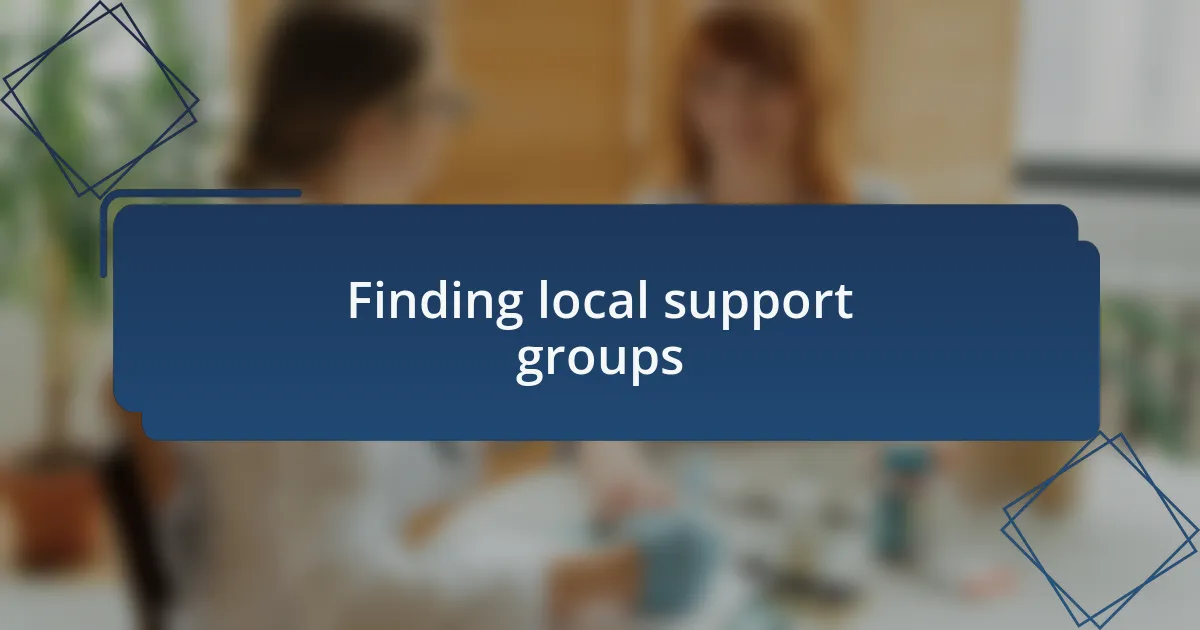
Finding local support groups
Finding local support groups is often the first step toward building meaningful connections. I recall stumbling across a meeting flyer at a local rehabilitation center, and my curiosity piqued. Attending that first gathering felt nerve-wracking, but it turned out to be one of the best decisions I ever made. Have you ever had one of those moments where you just knew you were in the right place?
Local community centers and online platforms can be great resources when searching for these groups. When I was looking for support in my own area, I turned to social media. I joined several Facebook groups dedicated to cerebral palsy, which not only connected me with others facing similar journeys but also led me to discover a local meetup. What’s even more exciting is that many of these groups often plan events, allowing for both emotional support and social interaction—two essential elements for anyone feeling isolated.
I’ve learned that reaching out for help is a sign of strength, not weakness. After finding my local support group, I quickly realized how essential these connections were to my personal growth. It’s a reminder that while navigating challenges alone can feel overwhelming, there’s a network out there, just waiting for you to step in. Have you considered what support could look like for you?
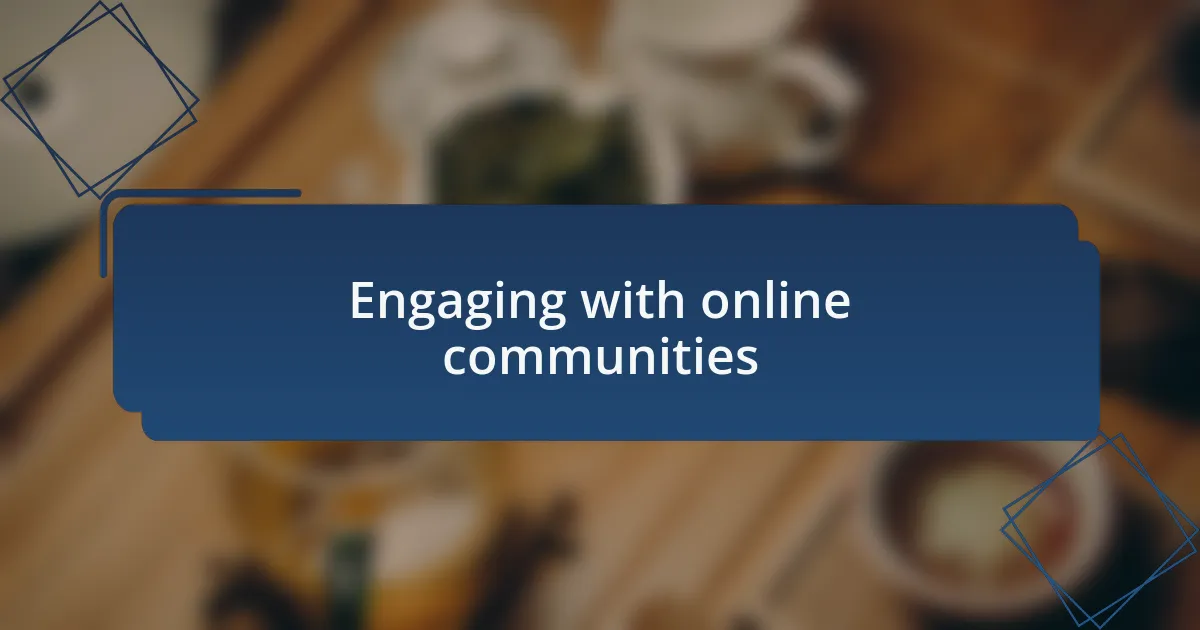
Engaging with online communities
Engaging with online communities has truly transformed how I connect with others. I remember scrolling through a forum one late night, feeling a little lost, and finding a thread where people were sharing their triumphs and struggles. It was comforting to see that others experienced the same frustrations I did with navigating life and cerebral palsy, reminding me that I wasn’t alone.
Social media platforms have become invaluable spaces for connection. I often participate in discussions and share my story in these groups, which can be incredibly liberating. Have you ever typed out your feelings and felt lighter as you hit ‘send’? When I share my challenges, I not only receive support but often find someone else who relates deeply. It’s amazing how conversations like these build understanding and solidarity among individuals who truly ‘get it.’
Participating in online events or webinars has added another layer to my community engagement. One particular virtual summit focused on coping strategies and self-advocacy; it felt like a breakthrough moment for me. Engaging with speakers and fellow attendees in real-time brought a sense of belonging. Have you ever found a resource online that resonated with you so deeply? For me, those moments remind me that our experiences, no matter how unique, can create powerful bonds across distances.
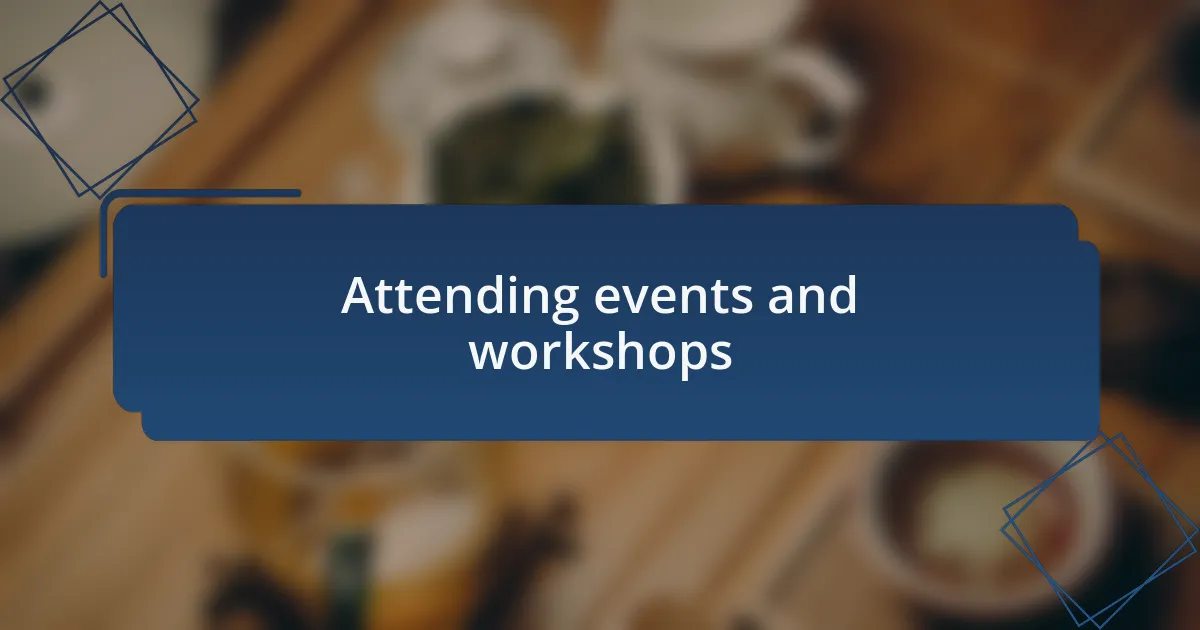
Attending events and workshops
Attending events and workshops can be a game changer in building connections within the cerebral palsy community. I vividly remember my first workshop where I met other individuals who shared similar experiences. The atmosphere was electric with shared stories, laughter, and occasionally, tears. Have you ever walked into a room and felt an immediate sense of belonging? That’s the kind of magic I encountered that day.
Participating in hands-on workshops enriches the knowledge I gain about coping mechanisms and resources. I recall a session focused on life skills where the facilitator emphasized practical strategies for daily challenges. It wasn’t just the information that struck me—it was the camaraderie as we practiced skills together. Isn’t it refreshing to learn in a supportive environment where each person’s input is valued?
What surprised me the most was the lasting friendships I formed from these events. One connection, in particular, blossomed into a partnership in advocacy efforts because we found a common cause that ignited our passion. It was incredible to realize how these gatherings weren’t merely about learning; they also became a launching pad for collaboration. Have you ever experienced the shift from being a participant to becoming a critical voice in your community? It’s a profound feeling, fostering connections that extend well beyond the event itself.

Sharing personal experiences
Sharing personal experiences is vital for building community connections. I can still hear the laughter from a support group meeting where everyone took turns sharing their stories. One woman spoke about her journey navigating public spaces, which resonated deeply with my own struggles. I felt a wave of relief as I realized I wasn’t alone. Isn’t it comforting to hear someone articulate your unspoken thoughts?
What I found particularly powerful was when a member shared a setback and how they turned it into a motivation for advocacy. Instead of feeling defeated, they inspired others to harness their challenges for change. I couldn’t help but reflect on my own experiences and how each setback had shaped my resilience. Have you ever felt that surge of inspiration from someone’s vulnerability? It’s an incredible catalyst for personal growth.
Additionally, I’ve learned that sharing experiences doesn’t just foster connection—it builds empathy. I remember during a discussion, one participant admitted to feeling isolated and misunderstood by friends and family. As they spoke, I saw heads nodding around the room, and in that moment, a collective understanding formed. It struck me how sharing our truths can create a bridge between our diverse experiences. Isn’t it remarkable how openness can transform relationships?
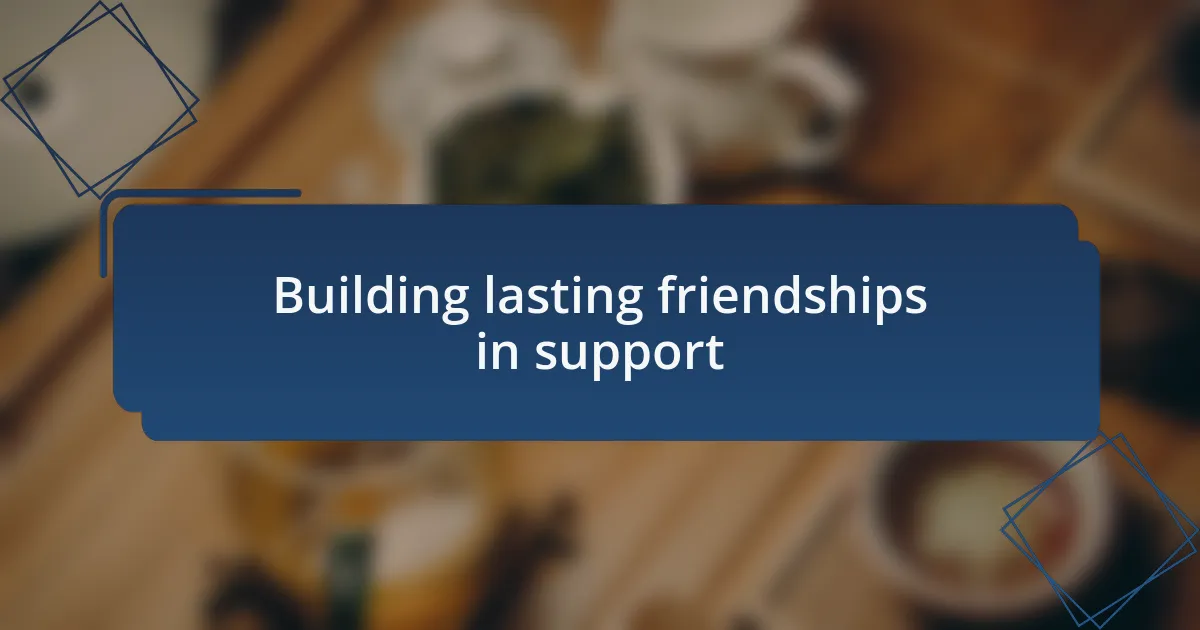
Building lasting friendships in support
Building lasting friendships in support means embracing vulnerability and being open with one another. I recall a time when I reached out to a fellow group member simply to check in. That small gesture turned into a long conversation about our shared experiences, and in that moment, I realized we weren’t just participants in a support group; we were becoming true friends. Have you ever experienced that moment when a simple act of kindness transforms into a meaningful bond?
Over time, I’ve discovered that these friendships thrive on shared activities outside the usual meetings. Organizing a coffee catch-up or attending an event together can strengthen these ties significantly. I once suggested a picnic, and to my surprise, it blossomed into a delightful day filled with laughter and stories. Isn’t it amazing how stepping outside our comfort zones can deepen our connections in unexpected ways?
As I reflect on these friendships, I see them as anchors in my life. They’re not just sources of support during tough times; they bring joy and laughter to my days. When a close friend from the group celebrated a personal milestone, we gathered to cheer them on, creating memories that I cherish deeply. Have you found a support system that feels like family? It’s truly inspiring when relationships evolve from shared challenges into lasting networks of love and encouragement.